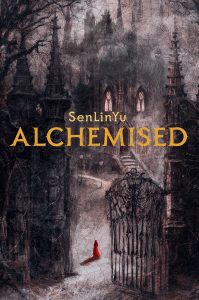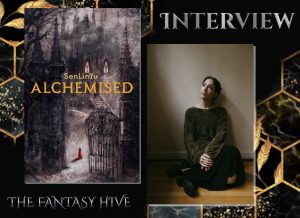Interview with SenLinYu (ALCHEMISED)
SenLinYu (she/they) grew up in the Pacific Northwest and studied classical liberal arts and culture. They started writing in the Notes app of their phone during their baby’s nap time. Their collected online works have garnered over twenty million individual downloads and have been translated into twenty-three languages. They live in Portland with their family. ALCHEMISED is their first novel.
Hi SenLinYu – welcome to The Fantasy Hive! It was a real pleasure to read Alchemised, which is a book with so much going on! Can I ask if it’s possible for you to sum the story up for those who haven’t read it yet?
Alchemised is a gothic war novel about a healer being kept prisoner in a deteriorating mansion while her captors try to discover what secrets her lost memories contain. It’s a nonlinear war story that focuses on parts of war that tend to be written out of the narrative.
The atmosphere of the book absolutely gripped me from the first page, with its almost gothic sense of dread, being trapped, losing oneself and slowly daring to hope (and love) against all odds. It’s darkly gorgeous and yet such a tragic, traumatic story – I can imagine readers on social media yelling ‘How could you do that to them?!’
I’d love to know what inspired you to write such a deeply complex tale?
I find gothic literature to be deeply compelling as a reader. It’s the genre that I’m most intensely drawn to because of how consuming it is. I can be an over-thinker, so I’m always looking for stories that will rip me out of my mind and make me lose track of myself for a while.
When I began writing, the inspiration was born from this rather Toni Morrison-esque desire to write the kind of book I kept looking for but couldn’t find. There were certain formulas and conclusions I kept seeing in literature that I wanted to explore differently, themes that I felt stories kept leaning away from in order to have a cleaner narrative arc.
As much as I adore love stories, I tend to struggle with romance as a genre because it’s presented as a formula of idealised love, and as a reader I don’t tend to connect with idealised versions of things. Horror, however, is often an inversion of romance, it’s about the obsession of love, the absence of love, etc. and since gothic literature is both a horror and romance genre, it was the perfect space to write a love story that very intensely explores the pain and hurt of love, where love is a force of nature, but not one that’s inherently pure or good.
 It’s a relatively familiar fantasy trope for the main character to start the book with amnesia, so the reader can discover what’s going on as the protagonist does. You take this in such a great direction, culminating in the restoration of memories as a time-jump so we actually get to see what happened, which makes for a much more intense experience. Did you ever consider telling the story in a linear manner, or was it always a journey of discovery for Helena?
It’s a relatively familiar fantasy trope for the main character to start the book with amnesia, so the reader can discover what’s going on as the protagonist does. You take this in such a great direction, culminating in the restoration of memories as a time-jump so we actually get to see what happened, which makes for a much more intense experience. Did you ever consider telling the story in a linear manner, or was it always a journey of discovery for Helena?
From the very beginning I conceptualised the story structurally as a literary triptych. A triptych is an art format that has three parts or panels, and the centre panel is the context for the first and third. So it was always imagined as being told out of order, however part of my concept for it was that it could be read multiple ways. Although I recommend the published order for the first read in order to fully experience the mystery element.
I find point-of-view to be a really fascinating component of storycraft and I wanted to tell a story that is almost deceptive. There’s a degree of artifice that functions almost like a gestalt switch, where it turns out there’s a multivalence to the story that you don’t necessarily pick up on the first pass because you’re enmeshed with Helena’s experience and perspective.
I was also very inspired by mystery novels. I think the suspense of mystery melds very well with a gothic atmosphere, but as a reader, I’d sometimes feel rather cheated by mysteries because the inciting event happens off-page, you don’t get to witness it; instead the story concludes with a character explaining everything for several pages. So Alchemised is a bit of me wanting to have my cake and eat it too, where you experience the mystery aspect of the story and then go back and actually experience what caused it too.
The setting of an unwinnable war was very poignant, and I saw parallels between events in the world today, mostly in terms of the terrible dehumanisation. Having soldiers fighting after death, torture and forced eugenics definitely dives into deep waters, but you do so with as much sensitivity and concern as possible, escalating with brutal honesty that these villains are BAD. Did you get any pushback for including such potentially difficult topics?
I was very lucky to have editors that understood my vision for the story. I feel like war in storytelling can often be used to just create a sense of epic, or create spectacle, and as a result we can become inured to what it actually is. Especially because culturally, wartime history is often sanitised in order to create certain ideological narratives, or a sense of national identity or heroism that people can take pride in, so that people will volunteer to do it in the future. As a result in political conversations, instead of talking about the violence or horrific realities of war which are too awful to put on the air, pundits often talk about it in terms of monetary cost. All of that contributes to war as a reality losing its meaning.
Svetlana Alexievich was a journalist whose work I frequently turned to when researching and writing Alchemised, and in the introduction to her book The Unwomanly Face of War she writes, ‘I would like to write a book about war that makes war sickening, and the very idea of it repulsive. Insane.’
So when I wrote Alchemised, I didn’t want to write the war as though it were merely a stage. I wrote it like it was the worst character in the entire book.
I have had readers who think I went too far, that I described things that are too horrifying to print, or think that I’m examining subjects that shouldn’t be written about in fiction, but I don’t think that the reality of war should be limited only to historians and military history hobbyists, while everyone else only knows Hollywood spectacle. Honestly, everything I depicted in Alchemised pales in comparison to the real world war crimes that come about from dehumanisation; Alchemised is still a very softened depiction of it.
The book never shies away from difficult moments, but I was actually thankful that there are no chapter breaks or cutaways to avoid looking at the unpleasant. Several scenes could certainly be classed as Body Horror, but when combined with Helena being a medic, it was never gratuitous. Was the decision to be explicit difficult, or simply as part of ramping up the awfulness of war?
It was very important to me to place the circumstances on the page, as inescapable to the reader as they are for Helena. Because of her role as a medic, her observations of things can be very clinical and unflinching as she has to make evaluations and proceed without letting her feelings interfere or affect her. Yet what she is witnessing is horrific, and rather than have that acknowledged, it’s brushed off and dismissed because care work isn’t heroic or valuable in the way combat is – care work is just what women are supposed to do. Helena’s choices are intrinsically tied to the hell that she’s trapped in, and so if the narrative flinched away from it, then those choices don’t make sense.
Another aspect of the story that I loved is how nobody in this book feels like a ‘lesser’ character, as everyone’s fights are very real to them as individuals (poor Ivy!). I think that’s an incredible achievement, reminding us that every life is valuable even amidst the turmoil of the plot. Did you have any favourite (or un-favourite!) characters as the book unfolded?
To be honest, I felt very sorry for almost all of the characters, with only a few exceptions. It was important to me to have them all be products of their circumstances. Not to justify their actions, but in order to ensure that there was a coherent motive behind the choices they made.
Love is a particularly recurring character motive throughout the story. There are several characters that are driven by their love for a specific person and the need they feel to protect them, and many of them allow their love to twist and destroy them. I didn’t want the theme of love to be as simple as ‘these characters were motivated by love, so they succeeded and/or survived,’ having that motive be shared by multiple characters but then setting them on a collision course really sharpened the tragedy.
It feels appropriate that I both loved and hated the relationship rollercoaster that is Helena and Kaine! They really do both go through so much, but I was honestly impressed that it never became repetitive or dull – I was always fully invested in their lives, and the conclusion was perfect. This may be the most unusual love story I’ve ever read, and it’s stayed with me even now, setting a very high bar for what comes after on my TBR pile!
How far did you plan their path, and were there any points where they ‘took over’ to take things in their own direction?
I would say overall, I always knew exactly where their relationship was going, although there were some gaps in the early drafts when I was figuring out how to get them there. I wanted their relationship to be this need for one another that was forged in the text, rather than being lust-driven, or a rapid infatuation. Given the stakes of the story, the relationship had to be a mutual emotional seduction, one that trapped them in this self-consuming obsession with one another. They’re both characters who are ‘too rational’ for love, but they’re just so starved for someone that understands them.
Thank you so much for taking the time to chat with me, and for writing what is undoubtedly one of my Top Books of 2025 – Cat @ The Fantasy Hive
Alchemised is out today from Michael Joseph – you can order your copy on Bookshop.org

